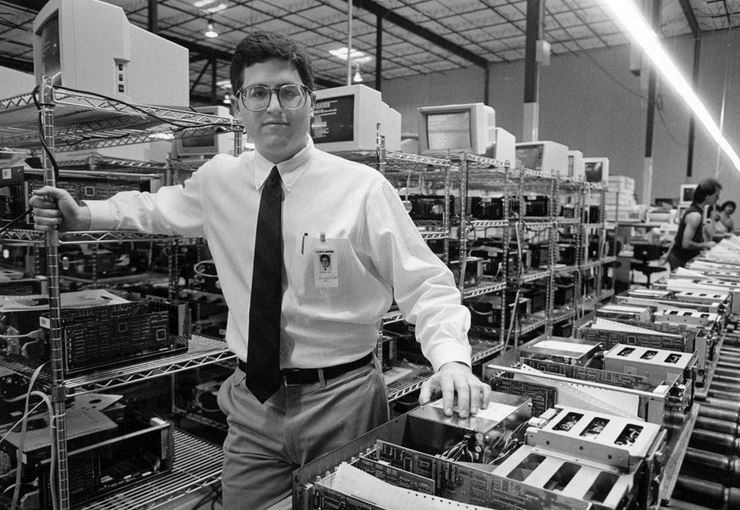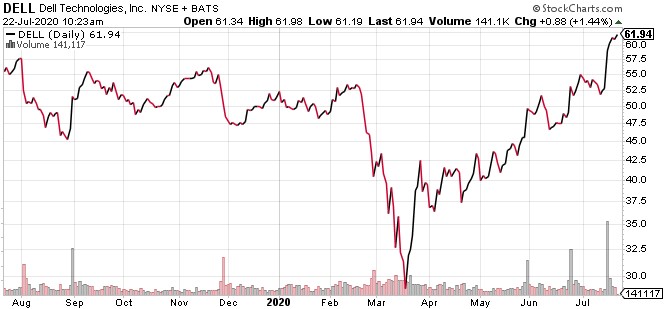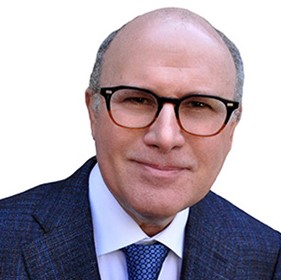There is a rubric for becoming rich. It’s tried and true, yet most small investors ignore the basic principles.
Michael Dell has created billions for investors and himself. Now, he’s at it again. A securities filing last week suggests a gigantic win for Dell Technologies (NYSE: DELL, Rated “C”) shareholders is in the offing.
Visionary is overused when describing business leaders. But Michael Dell is special. In high school he started selling Houston Post subscriptions by phone. When he realized most of his sales came from a specific demographic, he hired friends to scour public records to build a better list. According to “Direct from Dell”, a 1999 autobiography, he earned $18,000 in commissions as a 15-year-old.

As a 19-year-old freshman at the University of Texas, then 19, Dell noticed personal computing was going mainstream. He built a direct-to-customer business model and hobbled together a few order takers, shippers and three guys with screwdrivers.
Within a year, that business showed a gross profit of $198,367.
In the ensuing years, the eponymous computer company had a sophisticated supply chain in Asia and a distribution network without rival. When the internet shifted into high gear, Dell Computer began selling servers to enterprises and data centers. The company was the world’s largest PC maker by 2001, making the 36-year-old founder one of the richest people in the world.
Related post: Microsoft’s Scale is Winning the Cloud Race
Michael Dell made even more money for shareholders. Dell Computer stock was the best performing issue of the 1990s.
From its initial public offering June 23, 1988 through Dec. 31, 1999, shares advanced 50,776%. A $5,000 investment turned into $2,538,880.
The old Dell shares went away in 2013. After a nasty battle with stakeholders, Michael Dell, Silver Lake Partners and a group of bankers took the entire business private in a $24.9 billion leveraged buyout.
Leverage is key. The wise use of other people’s money is one of the keys to building wealth.
With plenty of help from bankers, Michael Dell began assembling a new empire. Dell Technologies merged with EMC Corporation in October 2016. The $67 billion transaction created a behemoth with severs, data storage, networking, security and cloud infrastructure.
It also gave the Round Rock, Texas-based company control over VMWare (NYSE: VMW, Rated “C”), a virtualization business.
VMWare is thriving. Its software lets companies run applications across several cloud computing environments. The company is now a $60 billion business.
According to a 10-Q filing with the Securities and Exchange Commission, Dell Technologies owns 81% of VMWare shares. Last week, Dell managers confirmed the company was entertaining options to spin-out that investment.
Keep in mind, Dell Technologies currently has a market capitalization of only $45 billion. The discrepancy between the Dell Technologies and VMWare valuations has everything to do with Dell’s $48 billion debt load and a conglomerate discount that investors normally place on holding companies. The idea is the value is locked inside the larger business.
Michael Dell wants to unlock that value. What investors should understand is he created it with the use of very little shareholder capital. He used ingenuity, vision and leverage.
In a note to clients Friday, a team of analysts at JPMorgan Chase (NYSE: JPM, Rated “C”) wrote that spinning out VMWare would totally eliminate the conglomerate discount. The investment firm moved Dell shares to its Analyst Focus List, with a price target of $80.
The current stock market machinations are a bit of a twist. At the start of 2018, many speculated that Michael Dell would resort to a reverse merger. At the time, VMWare was a smaller company. Raising the debt to buyout, Dell Technologies would have been risky.
Related post: Intel’s Surprise Advance May Be a Mirage
However, time and sound management at VMWare flipped the equation. The company began working on closing in 2019 with Amazon.com’s (Nasdaq: AMZN, Rated “C+”) Amazon Web Services, the largest public cloud vendor. Customers are flocking to VMWare’s latest hybrid cloud offering. Revenues reached $10.8 billion in fiscal 2020.
A Dell Technologies spin out of VMware would be a huge win for Dell shareholders. It would lift prices while not materially changing the core business. The company would still count as customers 100% of the top Software-as-a-Service companies, 100% of the top 20 automotive, retail, banking and insurance companies and 70% of the top 100 cloud computing companies.
Moreover, Dell is the leader in 15 of Gartner’s Magic Quadrants. It has 20,000 patents and spends $4.5 billion annually on research and development.
Despite the recent price run-up, growth investors should consider buying the stock now in anticipation of much higher prices.
Best wishes,
Jon D. Markman




